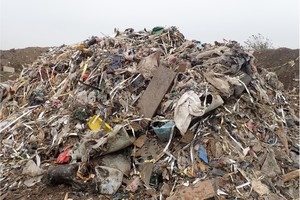Waste offences in Darlington have resulted in a Darlington man been given a two-year community order to incorporate 20 rehabilitation activity days and 300 hours unpaid work after magistrates in Middlesbrough sentenced him for serious waste offences. He was also disqualified from acting as a company director for three years and ordered to pay £490 costs.
John Burnside Jones (26), of Coniscliffe Road, Darlington was sentenced at Teesside Magistrates’ Court on Friday 2 September 2022 having previously pleaded guilty to involvement in illegally misdescribing waste for financial gain.

Environment Agency officers visited Jones’ waste operation at the Trinity Works site in Haverton Hill, Billingham in January 2019. They found the business to be processing large volumes of waste types which the site’s environmental permit did not allow. The site was also found to lack the required management systems to deal with the environmental risks. Jones was served with notices requiring details of the site’s waste but failed to respond to these in full.
Further investigations by the Environment Agency revealed that between September 2018 and February 2019, over 6,000 tonnes of unpermitted, combustible waste had been transported to the site from as far away as Bristol. Jones had then transported more than 11,000 tonnes of inert waste soils to a nearby landfill site during the same period. The discrepancy between the volumes of incoming and outgoing waste was a result of Jones mixing incoming waste with soil and stones left from previous site operations and falsely describing this resulting mixture as inert waste.
Inert waste incurs significantly lower landfill tax per tonne and may also be disposed of at a much-reduced rate at landfill facilities without the same level of safeguards and protections as would otherwise be required. By fraudulently misdescribing the waste, Jones was able to make large sums of money by flouting his environmental obligations.
In mitigation, Jones stated that although his company had operated the site, he had limited direct involvement and had been very naïve in relying upon others to run the site for him. He had never previously been in trouble and fully co-operated with the investigation. He admitted that he had never seen the site’s environmental permit and was oblivious to its requirements.
The court ruled that the offending was deliberate and committed for financial gain. At an earlier hearing the permit holder James William Mason, 64, of Camden Street, Stockton-on-Tees had pleaded guilty to allowing the illegal waste activities to be undertaken on his site and was ordered to pay a total of £2,528 in fines and costs.
The conditions of an environmental permit are designed to protect people and the environment. Failure to comply with these legal requirements is a serious offence that can damage the environment, undermine local legitimate environmental permit holders, put jobs at risk and cause misery for local communities.
We welcome sentencing by the Court, which should act as a deterrent to others considering flouting the law.
A spokesperson for the Environment Agency
In most situations waste can only be kept on land if there is an environmental permit in place. The permit will contain a number of conditions which must be observed in order to protect the environment. Failure to comply with the conditions of an environmental permit is a criminal offence which can be committed by the permit holder as well as the person conducting the activities if they are different. Any transfer of waste from one party to another must be accompanied by a controlled waste transfer note which accurately describes the waste and contains the relevant six-digit waste category code.
If you require advice or support for your waste business, please contact one of the Ashbrooke team.


